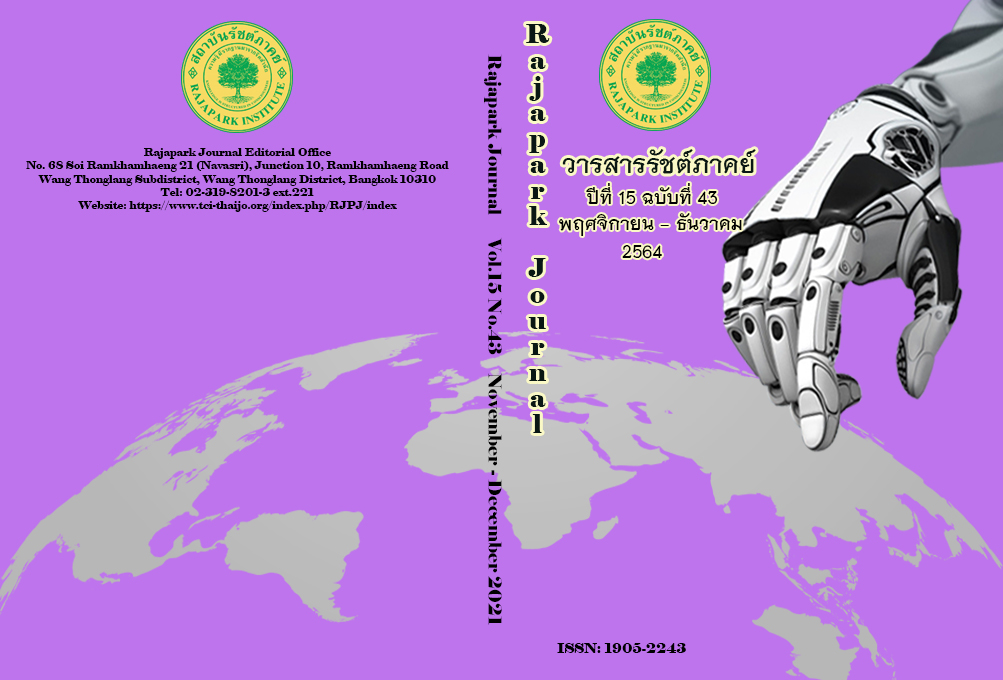Student Affairs in the 21st Century
Main Article Content
Abstract
The academic articles about student ventures in the 21st century present concepts about student affairs. According to the higher education act, B.E. 2562, the concept of student development strategy in higher education institutions (2017–2002) and the concept of learning activities outside the classroom in the 21st century world for student business studies have the dynamics of change in the 21st century, which is considered an element that will help develop and increase the potential for students to have a complete characteristic feature. It can be used to learn and develop the potential of work, including educational institutions must develop learners in knowledge and the skills of the 21st century to integrate 3 skills: (1) learning and innovation skills, (2) life and career skills, and (3) information and digital technology skills, such as idea design activities and knowledge training for 21st century work, community development volunteer club activities, digital entrepreneur skills activities, etc.
Article Details
Views and opinions appearing in the Journal it is the responsibility of the author of the article, and does not constitute the view and responsibility of the editorial team.
References
Bailey, T., Jaggars, S. S., & Jenkins, D. (2011). Introduction to the CCRC Assessment of Evidence Series. New York: Community College Research Center, Teachers College, Columbia University.
Bonwell, C. C., & Eison, J. A. (1991). Active Learning: Creating Excitement in the Classroom. Washington, D.C.: Jossey-Bass.
Cooper, M. (2010). Student Support Services at Community Colleges: A Strategy for Increasing Student Persistence and Attainment. Retrieved March 15, 2021, from https://www2.ed.gov/PDFDocs/college-completion/04-student-support-services-at-community-colleges.pdf
Daosuk, N. (2019). Student Activities with the Use of Technology to the Way of Life in the 21st Century. Retrieved March 27, 2021, from https://erp.mju.ac.th/acticleDetail.aspx?qid=1000
Innoi, S., & Boonsak, K. (2011). New Concepts of Student Affairs. Journal of Industrial Education, 10(2), 330-333.
Martin, J. (2010). The Meaning of the 21st Century. Bangkok: L. T. P.
McClelland, D. C. (1973). Testing for Competence Rather Than for “Intelligence”. American Psychologists, 28, 1-14.
Ministry of Labor. (2017). Ministry of Labor's Strategic Plan for Human Resource Development No.3 B.E. 2560-2564 (2017-2021). Bangkok: Office of the Permanent Secretary, Ministry of Labor.
National Education Act (No. 4), B.E. 2562. (2019, May 1). Government Gazette. Volume 136, Section 57A. p.49.
Natthunatiruj, R. (2019). The Student Affairs Administration of Higher Education Institutions in the 21st Century. Journal of Educational Administration Silpakorn University, 10(2), 11-23.
Office of the Higher Education Commission. (2018). Strategies for Student Development in Higher Education Institutions (2017-2021). Retrieved January 15, 2021, from http://old.rmutto.ac.th/rmuttonews/attachment/TR3332_235442.pdf
Panich, W. (2012). Organization of Learning and Knowledge Management (2nd ed.). Bangkok: Tathata.
Robles, M. (2012). Executive Perceptions of the Top 10 Soft Skills Needed in Today’s Workplace. Business Communication Quarterly, 75, 453-465. https://doi.org/10.1177/1080569912460400
Thanormchayathawat, B., Vanitsuppavong, P., Niemted, W., & Portjanatanti, N. (2016). 21st Century Skills: A Challenge for Student Development. The Southern College Network Journal of Nursing and Public Health, 3(2), 208-222.
Watanabutr, B. (2021). Factors Affecting that Impact on Soft Skills Development of Thai Youth in 21st Century. The Journal of Research and Academics, 4(1), 87-94.
Winichakul, W. (2014). Unite to Think About Learning. Bangkok: TK Park.
Yongstar, S. (2015). The Scenario of Administration of College of Islamic Studies, Prince of Songkla University, During the Next Decade (2012-2021). Journal of Islamic Studies, Prince of Songkla University, 6(1), 123-140.


